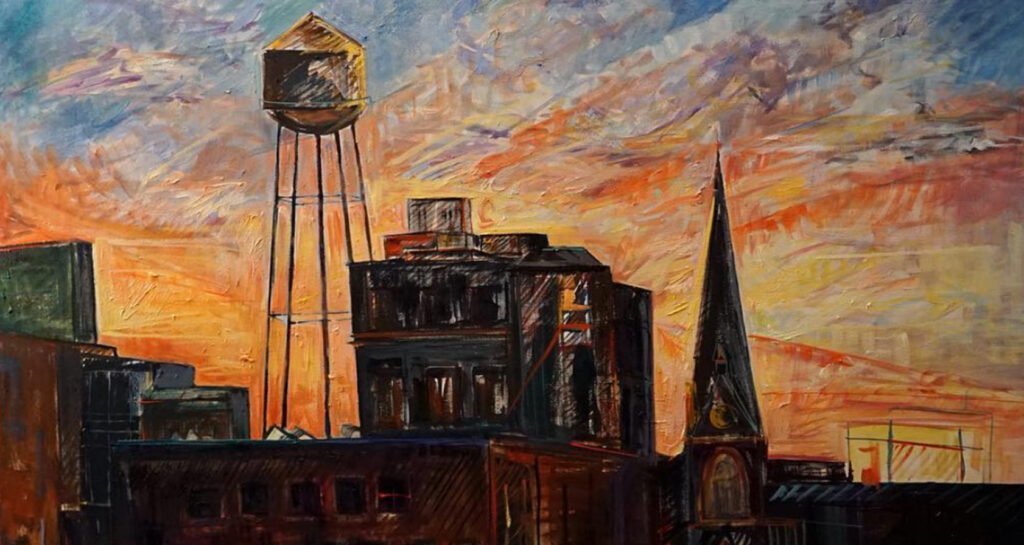
By Patricia Manwaring
In 2018 my husband and I took over a small coffee shop in Brooklyn. We were deeply rooted in a community seeking the face of God in our neighborhood, and I felt like God was calling us into marketplace ministry. I was believing for miraculous healing; for cancer to fall off of people as they stood in line to get a latte. I was believing for transformation and the tangible presence of God. For the kabod, the light of God ‘s glory to fill this little coffee shop in Brooklyn on earth as it is in Heaven.
In March of 2018, a group of women, leaving a Bible study, walked across the street and got hit by a car. Two children immediately were killed, one unborn child would die at birth. A young boy stood and watched a desperate mother giving CPR to her lifeless son, while his mother screamed over and over and over, “The children are dead!” I know this because she dialed my phone number and then handed the phone to a stranger. I heard her screaming in the background, and I will live with the sound of her cries reverberating through the chambers of my heart forever.
Over the next few weeks, many people in our neighborhood said how moved they were with the way our church had rallied together, the way God was being made visible in our love for each other. And as I walked home one night after having spent the day with my friend in her ocean of grief, I heard a voice telling me that God was using the death of these children to bring glory to his name. Was God only focused on his glory? Was the death of these kids somehow part of his plan to bring himself glory?
It was a devastating moment for our church, a tipping point in our narrative, the flicker of a question, a doorway cracked open to doubt the character of God. Many of the people who gathered in the hospital to pray, walked away from the church and from their faith over the next few years.
We didn’t have a theology that could hold us up. Someone said that the mothers loved their children so much that they had become idols; and God is a jealous God. Someone else said it was part of God’s plan to bring himself glory. Some people said it was demonic warfare. Someone else said that God chooses some people like wheat and others like chaff, their lives blown away in the wind, and who are we to judge? And like Job, left without an answer to his theodicy, we found ourselves standing at the edge of ourselves. And unlike Job, for many of us, the experience of God’s presence in the midst of our grief was not enough to quiet our hearts and confirm our faith.
And then covid happened and the fabric of our church took on a digital hue. And when we began to meet again in person we had lost people like patches in a quilt, or like an antiquilt. slowly coming undone. This March, five years from the car accident, I sat in the back of our Sunday gathering and the death that had shape shifted us wasn’t even acknowledged because the reality is that in a transient context not even our stories remain solid. As I looked around the room there was only a few people that had been there at the hospital, been there through the grief. For everyone else, it was just a normal Sunday.
A few months after the car accident later I was at a church service, in my hometown in Upstate New York, and I heard the story of a man who had been imprisoned after killing someone while drunk driving. He told how God met him in prison and transformed his life. I walked out. I didn’t want Dorothy Bruns,the woman who had killed Josh and Abby, children that I loved, to feel God’s grace. Not yet. She deserved to carry the weight of the pain that her actions had caused. I sat in my car weeping. The thought of her life continuing on and the potential for Gods transformative work in her life when the lives of these children had been snuffed out was too much for my heart to bear.
I found out the next day that she had killed herself that night. She swallowed a bottle of pills and was found dead in her Staten Island apartment early the next morning.
This began a season of spiritual disintegration, deconstruction and painful disorientation. I didn’t want to partner with God if it meant car accidents and tragedy. I had prayed over the bodies of Josh and Abby for resurrection. For a miracle. and God was silent. only to listen to the coldness and treachery of my heart as I begged him to show no mercy to Dorothy Bruns. I stopped going to church. I stopped praying. This was the season of sitting in the dark.
Fowler tells us that, “Faith has to do with the making, maintenance, and transformation of human meaning.” And for the first time in my life I felt like I had lost my faith and I was struggling to find meaning in the midst of tragedy. Steven Crites writes that stories are like dwelling places-people live in them, and the new story that I had begun to live in was completely de-centered from everything I thought I knew. I was deeply afraid that my kids were going to die, I had no guarantees that God would keep them or anyone else safe. God began to feel unsafe. And I would sit in my kitchen at night, alone and in the dark. And I would weep.
The coffee shop was one year into a ten year lease and we had no way out. I lived life going through the motions, the stress of being a new business owner in New York City, while homeschooling my small children, struggling with anxiety and depression, and deconstructing my faith-left me like a tea kettle always ready to explode in anger. And in the midst of it I felt God wasn’t angry at me for being angry at him. In the dark, I felt the quietness of his steady love.
One night I felt the spirit leading me to go through all the photos on my phone from 2018, and as I slowly looked through the snapshots of my life I realized there was somehow joy I kept forgetting about. I had been sustained by joy while only remembering the trauma. When we tell our stories we choose what to leave in and what to edit out. I had been editing out the joy. A few days later as I was walking to the coffee shop a verse came to my mind. In Luke 4:18:The spirit of the Lord is upon me because he has anointed me to preach the gospel to the poor, He has sent me to heal the brokenhearted, to proclaim liberty to the captives and recovery of sight to the blind, to set at liberty those who are oppressed.
I was brokenhearted, and Jesus said that his mission, his vocation, his calling was to bind up broken hearts. I was being invited to rediscover the gospel, not just as salvation from sins but as the binding of my Broken heart, a preferential option for the poor, freedom for the captive and a new way of seeing. This framework became the cornerstone of my resurrection. De Kock writes “that there is more to Christianity than sinners being saved from sin and God’s sense of justice being satisfied. Through what we have called salvation, God transforms human beings so that through his Spirit we have the mind of Christ; we are capable of communion with God”. Randall quotes Stanley Hauerwas as he writes that “The mysterious thing we call a self is best understood as a story. Thus, Randall continues, my self-creation is tied to my self-story, which means if I change my inner story, I change me.
With a new lens on the canonical story I saw Jesus going to the cross with joy set before him, I began to understand the song of Psalm 22 not as the despair of Christ but as a declaration. While the gospels only reference the first verse of the psalm it is likely that Jesus would have sung the entire thing, as was customary in Jewish practice. While it begins with the anguish of a broken heart, verse 24 declares “For he has not despised or scorned the suffering of the afflicted one; he has not hidden his face from him but has listened to his cry for help. This song from the cross is a pathway from pain into praise. De Kock tells Elie Wiesal’s holocaust story of watching a Jewish boy hung by the Nazi’s slowly die, in thirty minutes of struggle and agony. As someone in the crowd asks where is God now? Wiesel hears the answer from deep within himself. He is here. He is hanging there on the gallows.”
As I have come to know Jesus as the suffering God, my life story has begun to change. I see God there in the midst of the car accident with his heart broken. There with Josh and Abby as they took their last breaths on the cold pavement of a Brooklyn intersection. I see God there with Dorothy Bruns, and even if my heart in that moment was too small to love, His was not and is not and his love was extended to her as she sat in the dark with a bottle of pills in her hands. He sat with her. Her death in his.
The Christian faith has always been a journey into the unknown. The sacred “yes” of Abraham as he steps out of the familiar and into nomadic wanderings. “Yes,” to letting go of what he thinks he knows. “Yes”, to the adventure of the Spirit’s leading, as he follows the Word, sent/spoken by the Eternal Father. Abraham was promised sons like the stars. A nation of sons. And his reality was two children. And A wilderness existence. De Kock writes that Living a regenerative life is perilous yet vocational living, because it takes place between the already and the not yet in God’s story… It is a lot like driving in a heavy rainstorm: if you stop you might put other lives in danger, but to go forward may be just as perilous since all you have to go by are the faint road markings that come and go under the searching lights of your car, Yet you know that there is really only one way, and that is forward.
Like Abraham, we don’t say yes because we have a clear map to follow, or a plan forward; we say “yes”, because of who God is and what he is up to. We say “yes” because as we learn to listen to God’s voice we find that he is speaking a better Word, and telling a better story and inviting us to join him in the renewal of all things.

Patricia Manwaring is an oil painter. Homeschooling mother. Family cultivator. Jesus follower. Small business owner, and currently pursuing a Master’s Degree in Theology and Anthropology.
